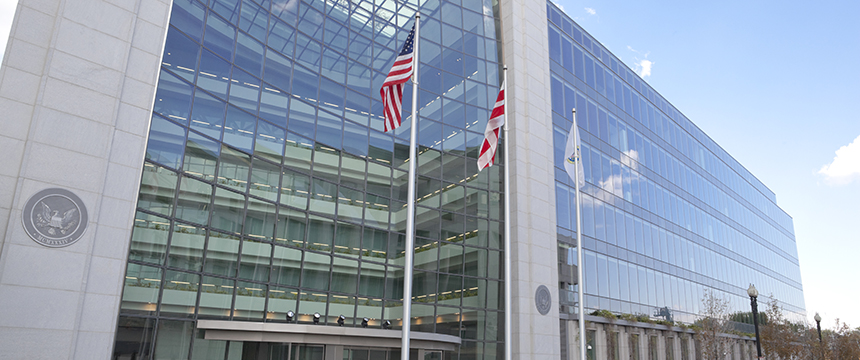SEC Focuses on Operational Continuity in Connection with Coronavirus (COVID-19)

The COVID-19 pandemic continues to disrupt business dramatically throughout the world, causing some companies to suspend operations entirely. Businesses able to remain open, in many cases, must accommodate remote-working environments to fight the rapid transmission of the disease, or extend remote-working directives for longer than initially hoped. Capital markets throughout the world continue to feel the sting of disruption. In that connection, the Securities and Exchange Commission (the “SEC” or the “Commission”) has issued an update to its response to the pandemic, focusing on the following priorities:
- continuity of SEC operations and monitoring market risks;
- assisting companies affected by COVID-19 with targeted regulatory assistance and guidance, including with regard to the operationalizing of business continuity plans, or “BCP(s)”; and
- maintaining enforcement and protection efforts, especially for critical markets and vulnerable investors.
SEC Operations and Market Monitoring
As of early March, the SEC moved almost entirely to remote daily operations, and it is preparing for the likelihood of remote Commission meetings. The Commission is stressing in its communications that all material functions of the SEC will continue as regularly as possible even while its Staff tracks risks and mitigates harms in the midst of the pandemic (including, for instance, by actively monitoring markets for frauds, illicit schemes and other misconduct affecting investors in connection with COVID-19). Indeed, the SEC wrote, “[t]hrough this period of nationwide challenge, we have remained fully operational and committed to our tripartite mission to protect investors; maintain fair, orderly, and efficient markets; and facilitate capital formation.” The SEC remains committed, even now, to advancing rulemaking initiatives, conducting inspections, bringing enforcement actions (as needed), and reviewing and commenting on issuer and fund filings.
The SEC aims to address the adverse effects of COVID-19 through a cross-divisional working group, with which the SEC will implement monitoring initiatives and conduct expanded outreach with issuers, exchanges, and other market participants. For instance, the following monitoring initiatives represent efforts developed in order to mitigate COVID-19’s harmful market effects:
- ensuring maintenance of trading, markets, and securities infrastructure through monitoring and direct contact with organizations, regarding the operational issues they currently face;
- keeping informed of activities and BCP-implementation efforts of major financial firms, gathering insights regarding the effects of COVID-19 on such firms and at the industry level, and coordinating with FINRA to identify material risks;
- asset management industry outreach for key players in the most severely affected markets and asset classes, including mutual funds, money market funds, exchange-traded funds, private equity funds and investment advisers;
- analyzing the actual and potential effects of COVID-19 on U.S. and global markets, including monitoring of price movements, credit ratings, capital flows, funding requirements and the availability of credit and capital;
- providing guidance to firms with respect to filings and disclosures, particularly with an eye to ensuring comprehensive risk factors, thorough MD&A (including carefully considered changes in trends and outlook) and regular reports on Form 8-K to apprise the public of company-specific issues that may arise in conneciton with COVID-19 (e.g., material plant closures, disruptions of supply chains and distribution channels, etc. – for more, please click here for a prior alert looking at disclosure compliance in greater depth); and
- coordinating with other regulators in the U.S and overseas, including the Department of the Treasury, the Department of Justice, the National Economic Council, the Federal Reserve Board, the FDIC, the OCC and, of course, the CFTC.
With respect to any nefarious activity in connection with the foregoing, the SEC expressed that now, as always, it will issue trading suspensions and exercise its wide range of enforcement tools, as needed, to ensure the successful pursuit of its key functions. With the COVID-19 pandemic, as with so many periods of uncertainty in the past, bad actors know that the odds of success in attempts to defraud people increase; but, the SEC knows this, too, and it issued an investor alert recently to warn people accordingly, reminding them that “[f]raudsters often use the latest news developments to lure investors into scams” and to “[b]e cautious of claims that a company’s products or services can help stop the coronavirus, especially claims that involve microcap stocks [which] may be made as part of fraudulent ‘pump-and-dump’ schemes.” As previously indicated, the SEC continues to work closely with other branches, divisions and departments of the U.S. government, and the Department of Justice – in a first enforcement action against COVID-19 fraud announced just in the past week – reminded the general public that, before making an investment, they should visit the SEC’s website to inform themselves better of potential fraud, research the SEC filings made by companies and take other self-protective measures.
Targeted Guidance and Relief
The SEC stated it will continue to provide specific regulatory assistance and guidance to affected entities, consistent with its actions since the beginning of the outbreak. Its efforts include such actions as: (i) notifying issuers that their responses to COVID-19 may constitute material disclosures that investors will consider in their “mix” of information, when making investment decisions; (ii) reminding issuers to work with their audit committees to ensure that financial reporting accounts for the new circumstances; (iii) granting relief for issuers that now intend to hold (or must hold) virtual annual meetings</a>; and (iv) conditionally extending the deadline for certain disclosure reports for companies (and click here for an update to that conditional relief).
BCP Implementation
Efforts with regard to BCPs have ramped up as well, with the Commission requesting copies of the BCPs of many regulated entities and details concerning implementation. Unsurprisingly, the focus is on reviewing compliance efforts relating to ensuring operational continuity during a pandemic. The Commission has also circulated questionnaires, requesting specific information concerning how effective the implementation of the BCP has been and the ways and extent to which operations have been disrupted.
Now and in the future, regulated entities should make sure that their BCPs are up-to-date, including the following priorities:
- Ensuring the continuity of operations and continuous communication between management and employees. Firms must stand ready to communicate with and support employees working remotely. Management must project preparedness by helping employees ramp up remote operations and by providing frequent updates concerning the firm’s status and plans for returning to standard operating procedures. Single points of contact (with back-ups) for crisis-related communications and clearly delineated responsibilities will go a long way in sustaining operations.
- Active monitoring of outbreaks and continuous contact with essential third-party providers. Firms should constantly monitor the progress of outbreaks to allow sufficient preparation for the likelihood that primary facilities will suffer negative consequences. Firms must insist on enhanced due diligence when engaging service providers to ensure that the operations relying on those services remain viable. Testing the ability of service providers to support business continuity and developing back-up plans will prove critical to maintaining processes during a crisis.
- Remote or alternative facilities arrangements when primary centers of operations must shut down. Firms should prepare back-up facilities, servers, and remote-work arrangements, as well as develop robust implementation plans. Testing the operations and security of back-up and remote facilities helps to ensure that the disruption does not cause material security risks or reduced quality of performance. Additionally, firms should ensure that equipment and resources equivalent to those available during standard operations exist during times of crisis.
- Frequent testing to improve effectiveness and verify that essential resources will continue to function. After memorializing BCPs in writing, firms must also test them to identify deficiencies and improve responsiveness. Each BCP bears some weaknesses and unforeseen issues, which robust testing can help to expose for preemptive resolution or mitigation.
- Suspension of non-essential activities, while minimalizing harm to core functions.
- Availability of cash. To meet payroll and insurance responsibilities, as well as satisfy obligations to third parties, firms must ensure steady and stable liquidity during a crisis, particularly because unanticipated supply-chain issues and loss of business can dramatically reduce earnings and normal operations. Companies should aim to maintain sufficient cash reserves, strive to maintain liquid assets, and keep aware of their revenue cycles. Suspension of discretionary spending and non-essential activities at the outset of a crisis will also help the company maintain its emergency-cash supply.
Enforcement
The SEC continues its enforcement and investor-education efforts, with increasing focus on fraud and misconduct relating to COVID-19. It has already issued at least two trading suspensions in connection with COVID-19 related activities (against Aethlon Medical, Inc. and Eastgate Biotech).
Going forward, corporate response to COVID-19 will constitute a material factor in SEC enforcement actions. The details, implementation and effectiveness of BCPs (or lack thereof) in particular will comprise an essential consideration for companies subject to regulation by the SEC, so companies should strive to develop, implement, test, and improve BCPs, as well as undertake more extensive due diligence when contracting with third parties to reduce the likelihood of a crisis materially hampering operations.
Foley boasts a multi-disciplinary and multi-jurisdictional team that continues to amass and refine a wealth of topical client resources and stands ready to help our clients meet the legal and business challenges that the COVID-19 pandemic continues to impose on stakeholders across a diverse range of industries. Click here for Foley’s Coronavirus Resource Center to stay apprised of relevant developments, insights, and resources to support your business during this challenging time. To receive this content directly in your inbox, click here and submit the form.

